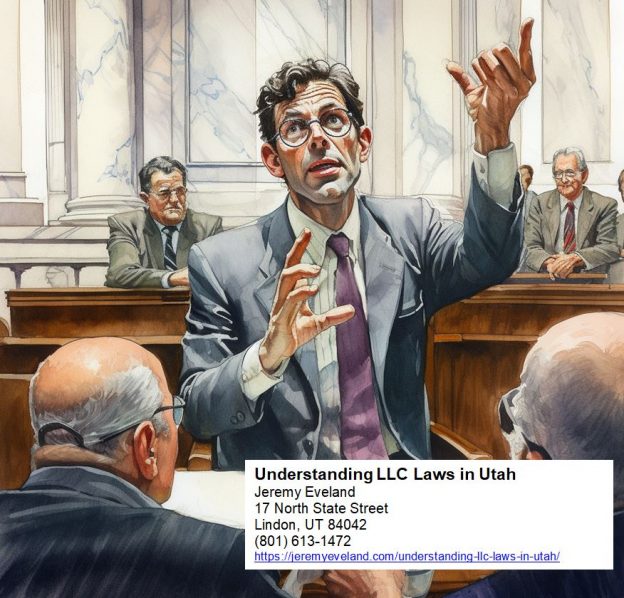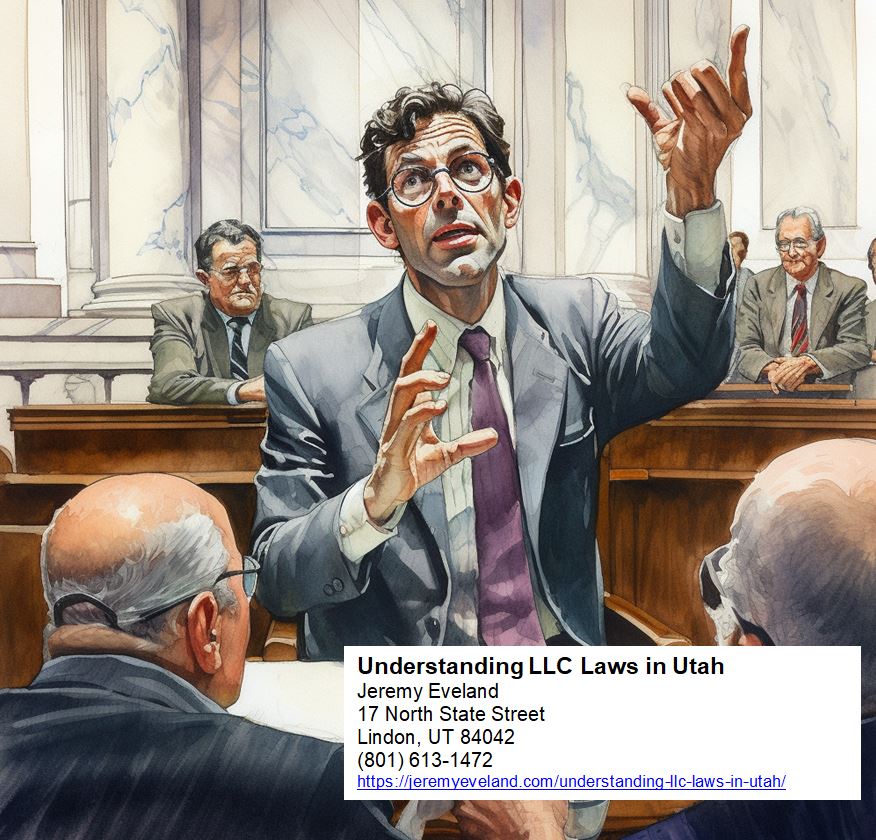Business Law is a complex and constantly evolving area of law that is essential for the success of any business. It covers a wide range of legal issues, including contracts, employment law, intellectual property, and liability, among others. Given the importance of these legal issues, businesses in Tooele, Utah need to have a qualified and experienced business lawyer to provide legal advice, guidance, and representation.
A business lawyer in Tooele, Utah is a professional who specializes in the legal aspects of running a business. They are trained to help business owners understand and comply with the laws and regulations that govern their operations. They also provide legal advice and representation on a variety of legal matters that businesses may encounter, including contract disputes, employment disputes, and intellectual property issues.
The roles and responsibilities of a business lawyer in Tooele, Utah are numerous and varied. They are responsible for providing legal advice and guidance to businesses on a wide range of legal issues. This includes advising businesses on the proper legal structure for their operations, reviewing and drafting contracts, and representing businesses in legal disputes. They also help businesses comply with regulatory requirements and ensure that all necessary legal documents and filings are filed correctly and promptly. In addition, business lawyers in Tooele, Utah play a critical role in advising businesses on mergers, acquisitions, and partnerships, helping to ensure that these transactions are completed in a legally sound and effective manner.
To be an effective business lawyer in Tooele, Utah, a person must possess several key qualifications and skills. Firstly, they must have a strong legal education and training, typically having earned a law degree and passed the bar exam. Secondly, they must have substantial experience in the practice of business law, which includes understanding the legal issues that businesses face and how to address them. Additionally, they must have excellent communication and negotiation skills, as they will often be called upon to interact with clients, opposing counsel, and government agencies. Furthermore, they must have the ability to manage complex legal matters, including conducting legal research, preparing legal documents, and negotiating settlements. Finally, they must have a thorough knowledge of local and federal laws that govern business operations in Kearns, Utah.
Many types of businesses can benefit from the services of a business lawyer in Tooele, Utah. Small businesses, startups, corporations, non-profit organizations, and limited liability companies (LLCs) are among the many types of businesses that can benefit from the expertise of a business lawyer. These businesses face a wide range of legal issues and challenges, and a business lawyer can provide valuable guidance and representation to help them navigate these challenges and achieve success.
To hire a business lawyer in Tooele, Utah, it is important to take the time to research potential candidates. This may involve asking for referrals and recommendations from other business owners and conducting online research to identify lawyers with the necessary qualifications and experience. Once you have identified a list of potential candidates, it is important to review their credentials and experience to determine which lawyer is best suited to meet your legal needs. You should also schedule a consultation to discuss your legal needs and to determine whether the lawyer is a good fit for your business. Finally, it is important to choose a lawyer who meets your legal needs, budget, and communication style.
A business lawyer in Tooele, Utah is an essential resource for businesses of all sizes and types. They provide legal advice and representation on a wide range of legal issues and help businesses comply with regulatory requirements and avoid legal disputes. With the right qualifications, experience, and skills, a business lawyer can help businesses in Tooele, Utah achieve success and growth.
Role and Responsibilities of a Business Lawyer in Tooele, Utah
The role and responsibilities of a business lawyer in Tooele, Utah can vary depending on the size and type of business they are representing. However, generally speaking, business lawyers in Kearns, Utah play a crucial role in providing legal advice and representation on a wide range of legal issues that businesses may face. Some of the key responsibilities of a business lawyer in Tooele, Utah include:
Legal Advice and Guidance: Business lawyers in Tooele, Utah provide legal advice and guidance to their clients on a wide range of legal issues, including contracts, employment law, intellectual property, and liability, among others. They help businesses understand the laws and regulations that govern their operations and advise them on the best course of action to take.
Contract Drafting and Review: Business lawyers in Tooele, Utah are responsible for reviewing and drafting contracts for their clients. This includes employment contracts, supplier contracts, and customer contracts, among others. They ensure that these contracts are legally binding and protect the interests of their clients.
Representation in Legal Disputes: Business lawyers in Tooele, Utah represent their clients in legal disputes, including contract disputes, employment disputes, and intellectual property disputes, among others. They provide their clients with the legal representation they need to achieve a favorable outcome in these disputes.
Legal Compliance and Regulatory Issues: Business lawyers in Tooele, Utah help their clients comply with the various laws and regulations that govern their operations. This includes advising on tax laws, employment laws, and environmental laws, among others. They help their clients avoid legal disputes and penalties by ensuring that they comply with the law.

Mergers, Acquisitions, and Partnerships: Business lawyers in Tooele, rns, Utah play a critical role in advising businesses on mergers, acquisitions, and partnerships. They help their clients navigate the complex legal issues associated with these transactions, including due diligence, negotiation, and drafting of legal agreements, among others.
In summary, the role and responsibilities of a business lawyer in Tooele, Utah are diverse and encompass a wide range of legal issues. They play a crucial role in advising businesses on the law and providing representation in legal disputes, helping their clients achieve success and growth.
Qualifications and Skills of a Business Lawyer in Tooele, Utah
To be a successful business lawyer in Tooele, Utah, one must possess a specific set of qualifications and skills. Some of the key qualifications and skills of a business lawyer in Kearns, Utah include:
Legal Education: Business lawyers in Tooele, , Utah must have a Juris Doctor (J.D.) degree from an accredited law school and be licensed to practice law in the state of Utah. This requires completing a rigorous legal education that covers a wide range of legal topics and subjects.
Business Acumen: Business lawyers in Tooele, Utah must have a strong understanding of business and commerce, including finance, economics, and accounting. They must have the ability to understand complex business issues and advise their clients on the best course of action to take.
Excellent Communication Skills: Business lawyers in Tooele, Utah must have excellent written and verbal communication skills. They must be able to communicate complex legal concepts and ideas to their clients clearly and concisely, and e able to negotiate effectively on their client’s behalf.
Attention to Detail: Business lawyers in Tooele, Utah must have a keen eye for detail and be able to review and analyze complex legal documents. They must be able to identify potential legal issues and take steps to address them before they become major problems.
Problem-Solving Skills: Business lawyers in Tooele, Utah must have excellent problem-solving skills and be able to find creative solutions to complex legal problems. They must be able to think critically and analytically and find innovative ways to resolve disputes and achieve their client’s goals.
Ethical Conduct: Business lawyers in Tooele, Utah must adhere to the highest ethical standards and be committed to providing their clients with honest and fair representation. They must be able to act with integrity and maintain their clients’ confidential information.
In conclusion, to be a successful business lawyer in Tooele, Utah, one must possess a strong combination of legal education, business acumen, excellent communication skills, attention to detail, problem-solving skills, and ethical conduct. These qualities and skills are critical for providing effective legal representation to businesses and achieving positive outcomes for their clients.
Types of Businesses That Can Benefit from a Business Lawyer in Tooele
A variety of businesses in Tooele, Utah can benefit from the services of a business lawyer. Some of the types of businesses that can benefit from the services of a business lawyer in Tooele, Utah include:
Small Businesses: Small businesses in Tooele, Utah often face a range of legal issues, including contract disputes, employment disputes, and liability issues, among others. A business lawyer can help small businesses navigate these legal issues and provide advice on the best course of action to take.
Startups: Startups in Tooele, Utah face unique legal challenges, including intellectual property protection, venture capital financing, and employment law issues, among others. A business lawyer can help startups understand the legal issues they face and provide guidance on how to address these issues.
E-Commerce Businesses: E-commerce businesses in Tooele, Utah face a range of legal issues, including data privacy, intellectual property, and consumer protection, among others. A business lawyer can help e-commerce businesses understand these legal issues and provide guidance on how to address them.
Real Estate Businesses: Real estate businesses in Tooele, Utah face a range of legal issues, including contracts, zoning laws, and property disputes, among others. A business lawyer can help real estate businesses understand these legal issues and provide guidance on how to address them.
Manufacturing and Distribution Businesses: Manufacturing and distribution businesses in Tooele, Utah face a range of legal issues, including contracts, liability, and intellectual property, among others. A business lawyer can help these businesses understand these legal issues and provide guidance on how to address them.
In conclusion, businesses of all sizes and types in Tooele, Utah can benefit from the services of a business lawyer. Business lawyers in Tooele, Utah can provide legal advice and representation on a wide range of legal issues, helping businesses navigate the complex legal landscape and achieve success and growth.
How to Hire a Business Lawyer in Tooele, Utah
Here are some steps you can follow to hire a business lawyer in Tooele, Utah:
Identify Your Legal Needs: The first step in hiring a business lawyer in Tooele, Utah is to determine your legal needs. Consider the types of legal issues your business is facing, and identify the areas where you need legal assistance.
Research and Gather Referrals: Once you have identified your legal needs, research and gather referrals to find qualified business lawyers in Tooele, Utah. You can ask for referrals from other businesses, use online directories or websites, or consult with the Utah State Bar Association.
Schedule Consultations: Schedule consultations with a few business lawyers in Tooele, Utah. During the consultation, ask questions about their experience, qualifications, and fees, and assess their ability to meet your legal needs.
Check Credentials and References: Before hiring a business lawyer in Tooele, Utah, check their credentials and references. Ensure that they are licensed to practice law in the state of Utah and that they have a good reputation and track record of success in representing businesses.
Review the Contract: Once you have selected a business lawyer in Tooele, Utah, review the contract or engagement letter carefully. Ensure that the terms of the agreement are clear and that you understand the services the lawyer will provide and their fees.
In conclusion, hiring a business lawyer in Tooele, Utah requires careful research and due diligence. By following these steps, you can find a qualified and experienced business lawyer who can provide effective legal representation and support your business’s success.
The services of a business lawyer are essential for businesses of all sizes and types in Tooele, Utah. Business lawyers in Tooele, Utah can provide legal advice and representation on a wide range of legal issues, helping businesses navigate the complex legal landscape and achieve success and growth. Hiring a business lawyer in Tooele, Utah requires careful research and due diligence, but by following the steps outlined, you can find a qualified and experienced business lawyer who can meet your legal needs and support your business’s success. Whether you are a small business owner, a startup, an e-commerce business, a real estate business, or a manufacturing or distribution business, a business lawyer in Tooele, Utah can provide valuable legal support and help you achieve your goals.
Navigating Business Law in Tooele, Utah: Why You Need a Skilled Business Lawyer
The Importance of Having a Business Lawyer in Tooele, Utah
As a business owner, you are bound to face legal issues at some point. Whether it’s drafting contracts, dealing with employees or protecting your intellectual property, navigating the legal landscape can be challenging without the help of an experienced professional. This is where a business lawyer comes in.
Explanation of What a Business Lawyer Is
A business lawyer is an attorney who specializes in providing legal advice and representation to businesses and their owners. They are trained to understand the intricacies of business law and are equipped with the skills necessary to help their clients navigate complex legal issues.
In addition to providing legal advice, business lawyers can also assist with various aspects of business operations, such as drafting contracts, negotiating deals and helping with regulatory compliance. They can also represent businesses in court should any disputes arise.
The Importance of Having a Business Lawyer in Tooele, Utah
Having a business lawyer is especially important for businesses operating in Tooele, Utah. The state has specific laws that govern how businesses operate within its borders and it’s important for businesses to comply with these laws to avoid potential legal issues. Moreover, having a local business lawyer provides several benefits including familiarity with local laws and regulations as well as access to local resources such as courts and government agencies.
Having a business lawyer is crucial for any company looking to avoid costly legal problems down the road. In Tooele, Utah specifically, it’s highly recommended that businesses seek out the services of an experienced local attorney who understands the unique challenges faced by companies operating within this jurisdiction.
Overview of Business Law in Tooele, Utah
Explanation of the Legal System in Tooele, Utah
Before delving into the specifics of business law in Tooele, Utah, it’s important to understand the legal system in place. The state operates under a common law legal system which means that judges base their decisions on past cases and interpretations rather than a strict set of written laws. Tooele County is part of the Third Judicial District Court which handles civil matters including business disputes.
The district court is divided into several departments depending on the type of case or issue at hand. For example, there are specialized departments for family law cases and commercial disputes.
Types of Business Entities Recognized by the State
Utah recognizes several types of business entities including sole proprietorships, partnerships (general and limited), limited liability companies (LLC), corporations (C-Corp and S-Corp), and nonprofit organizations. Each entity type has its own advantages and disadvantages based on factors such as taxation and liability.
Sole proprietorships are the simplest form of business entity but offer no personal liability protection for owners. Partnerships can be established with one or more partners who share ownership but also share any profits or losses incurred by the business.
LLCs offer liability protection for members while still allowing for flexible management structures. Corporations have a separate legal identity from their owners but require formal annual meetings and document filings.
Overview of Laws Related to Contracts, Employment, and Intellectual Property
Tooele follows federal laws regarding contracts, employment, and intellectual property but also has state-specific regulations to consider. Contract law governs agreements between parties including purchase agreements and service contracts.
Employment law covers issues such as hiring practices, workplace safety standards, discrimination protection laws etc., Intellectual property rights deal with trademark infringement lawsuits among others. In Tooele, Utah, businesses are required to comply with state and federal employment laws.
This includes following minimum wage laws and providing workers’ compensation insurance. Businesses in Utah also have legal obligations to protect consumers from unfair trade practices under the jurisdiction of the Utah Consumer Sales Practices Act.
Services Offered by Business Lawyers in Tooele, Utah
Formation and Registration of Businesses
When starting a business, a lawyer can be an invaluable resource in navigating the legal requirements for business formation. Depending on the type of business entity chosen by the owner(s), there are different requirements for registration with the state.
A business lawyer can assist with drafting and filing necessary paperwork, ensuring compliance with state and federal regulations, as well as advising on the best options for tax classification. Additionally, they can help guide owners through any potential pitfalls during formation that could lead to issues down the road.
Contract Drafting and Review
Contracts are an essential part of any business transaction or relationship. A skilled business lawyer can assist clients in crafting contracts that protect their interests while remaining legally binding.
Business lawyers in Tooele also provide review services for contracts drafted by other parties who may include terms that could be harmful to a client’s interests. They can help negotiate revisions or amendments to ensure that all parties involved feel comfortable proceeding forward with a contract agreement.
Employment Law Advice
Employment law is complex and constantly changing which makes it difficult for small businesses to stay up-to-date on all relevant regulations. Seeking advice from a qualified business lawyer can provide employers peace of mind knowing they’re adhering to all relevant laws governing hiring practices.
Business lawyers assist employers in creating employee handbooks containing policies related to hiring practices, employee rights, proper conduct at work etc., as well as handling disputes between employees or between employees and employers. Overall, Business lawyers in Tooele Utah offer a wide range of services to help business owners navigate the legal landscape, protect their interests, and ensure compliance with all relevant regulations.
Formation and Registration of Businesses
Assistance with Choosing the Right Type of Entity for Your Business
When starting a business, one of the most critical decisions you’ll have to make is deciding what type of entity to form. This decision affects the way your business operates, how it’s taxed, and your personal liability as an owner.
A skilled business lawyer in Tooele, Utah can help determine which entity is best suited for your circumstances. They’ll consider factors such as the number of owners, the nature of the business, and potential liability issues.
Preparation and Filing of Necessary Paperwork
Starting a new business requires a lot of paperwork. A business lawyer can help prepare and file all necessary documents required by the state or federal government.
These documents include articles of incorporation or organization, bylaws or operating agreements, tax forms, licenses and permits. An attorney will ensure that all paperwork is completed correctly to avoid potential legal issues down the road.
Compliance with State and Federal Regulations
Maintaining compliance with state and federal regulations is crucial for any business owner. A skilled business lawyer in Tooele will stay up-to-date on complex laws and regulations that affect businesses in Utah to ensure that their clients comply with each requirement.
Contract Drafting and Review
Reviewing Agreements to Ensure They Are Legally Binding
Contracts are an essential aspect of any successful business relationship or transaction. An experienced attorney can review proposed contracts or agreements related to transactions involving suppliers, service providers, buyers, or any other party involved in your operations before you sign them. This process ensures that each document has suitable legal terms ensuring they are legally binding.
Drafting Contracts That Protect Your Interests
Drafting strong contracts requires experience creating legally binding documents that protect your interests. A skilled lawyer can help craft language in contracts to protect your business from potential liability or disputes with customers, suppliers, or other parties.
Negotiating Terms with Other Parties Involved in the Contract
Business lawyers commonly negotiate terms between parties involved in a contract. They understand the legal implications of each provision and can advocate on behalf of their clients’ interests during negotiations.
Employment Law Advice
Advising on Hiring Practices and Employee Classification
Hiring practices and employee classification are essential issues for businesses. A knowledgeable business attorney can assist throughout the hiring process and ensure that employers follow proper procedures to stay compliant with federal, state, and local laws.
Creating Employee Handbooks and Policies
A well-crafted employee handbook is a vital resource for any small business owner. It establishes clear guidelines for employees regarding behavior expectations, benefits information, company policies, etc. An attorney can help draft comprehensive handbooks that include legally required workplace policies such as safety procedures, harassment policies, leave policies among others.
Handling Disputes Between Employees or Between Employees and Employers
At times disputes will arise between employees or between employees and employers in any organization. An experienced lawyer can assist by providing mediation services or represent clients during litigation proceedings which may arise from the dispute.
Intellectual Property Protection
Trademark Registration
Trademark registration offers protection against individuals illegally using registered marks owned by a company; it protects brands giving them an identity. Experienced attorneys specializing in intellectual property law can walk you through trademark registration processes to ensure that your brand is adequately protected under Utah’s laws.
Copyright Registration
Copyright protection is an integral component of intellectual property law applicable to creative works like books songs music records among many others. An intellectual property lawyer can help you with copyright registration processes to safeguard your tangible work from duplication, distribution, or other violations.
Conclusion
A business lawyer in Tooele, Utah provides a wide range of services that protect your business and help it run more efficiently. From advice on employment law to helping draft contracts and agreements between parties involved in your business operations, these lawyers are indispensable. By hiring an experienced attorney to represent your company, you can ensure that all legal matters are handled correctly and efficiently so that you can focus on growing your business with peace of mind.
Areas We Serve
We serve individuals and businesses in the following locations:
Salt Lake City Utah
West Valley City Utah
Provo Utah
West Jordan Utah
Orem Utah
Sandy Utah
Ogden Utah
St. George Utah
Layton Utah
South Jordan Utah
Lehi Utah
Millcreek Utah
Taylorsville Utah
Logan Utah
Murray Utah
Draper Utah
Bountiful Utah
Riverton Utah
Herriman Utah
Spanish Fork Utah
Roy Utah
Pleasant Grove Utah
Kearns Utah
Tooele Utah
Cottonwood Heights Utah
Midvale Utah
Springville Utah
Eagle Mountain Utah
Cedar City Utah
Kaysville Utah
Clearfield Utah
Holladay Utah
American Fork Utah
Syracuse Utah
Saratoga Springs Utah
Magna Utah
Washington Utah
South Salt Lake Utah
Farmington Utah
Clinton Utah
North Salt Lake Utah
Payson Utah
North Ogden Utah
Brigham City Utah
Highland Utah
Centerville Utah
Hurricane Utah
South Ogden Utah
Heber Utah
West Haven Utah
Bluffdale Utah
Santaquin Utah
Smithfield Utah
Woods Cross Utah
Grantsville Utah
Lindon Utah
North Logan Utah
West Point Utah
Vernal Utah
Alpine Utah
Cedar Hills Utah
Pleasant View Utah
Mapleton Utah
Stansbury Par Utah
Washington Terrace Utah
Riverdale Utah
Hooper Utah
Tremonton Utah
Ivins Utah
Park City Utah
Price Utah
Hyrum Utah
Summit Park Utah
Salem Utah
Richfield Utah
Santa Clara Utah
Providence Utah
South Weber Utah
Vineyard Utah
Ephraim Utah
Roosevelt Utah
Farr West Utah
Plain City Utah
Nibley Utah
Enoch Utah
Harrisville Utah
Snyderville Utah
Fruit Heights Utah
Nephi Utah
White City Utah
West Bountiful Utah
Sunset Utah
Moab Utah
Midway Utah
Perry Utah
Kanab Utah
Hyde Park Utah
Silver Summit Utah
La Verkin Utah
Morgan Utah
Business Lawyer Tooele Utah Consultation
When you need help from a Business Lawyer in Tooele Utah call Jeremy D. Eveland, MBA, JD (801) 613-1472 for a consultation.
Jeremy Eveland
17 North State Street
Lindon UT 84042
(801) 613-1472
Home
Related Posts
Can I Dispute A Contract?
Business Lawyer Sandy Utah
Business Lawyer Ogden Utah
Writ of Restitution
Business Lawyer Layton Utah
Impact of Environmental Regulations on Business Law Compliance
Business Lawyer South Jordan Utah
Business Lawyer Lehi Utah
Business Lawyer Millcreek Utah
Business Lawyer Taylorsville Utah
How Artificial Intelligence is Shaping the Future of Business Law
Estate Planning is Crucial for People of All Income Levels
Business Lawyer Murray Utah
Business Lawyer Draper Utah
Navigating Legal Challenges in Business Succession Planning
Business Lawyer Bountiful Utah
Business Lawyer Riverton Utah
How To Structure A Merger Or Acquisition In Utah
How To Hire Employees Legally in Utah
Business Lawyer Herriman Utah
10 Tips for Negotiating Lease Agreements
Business Lawyer Spanish Fork Utah
How To Start A Non-Profit In Utah
Business Lawyer Roy Utah
What are the Trademark Laws in Utah
Business Lawyer Pleasant Grove Utah
Utah Wholesale Business Law
Business Lawyer Kearns Utah
How to Form an LLC in Utah
Business Lawyer Tooele Utah
[geocentric_weather id=”f50c5360-99ba-42c1-9a40-6af2d3fec9c7″]
[geocentric_about id=”f50c5360-99ba-42c1-9a40-6af2d3fec9c7″]
[geocentric_neighborhoods id=”f50c5360-99ba-42c1-9a40-6af2d3fec9c7″]
[geocentric_thingstodo id=”f50c5360-99ba-42c1-9a40-6af2d3fec9c7″]
[geocentric_busstops id=”f50c5360-99ba-42c1-9a40-6af2d3fec9c7″]
[geocentric_mapembed id=”f50c5360-99ba-42c1-9a40-6af2d3fec9c7″]
[geocentric_drivingdirections id=”f50c5360-99ba-42c1-9a40-6af2d3fec9c7″]
[geocentric_reviews id=”f50c5360-99ba-42c1-9a40-6af2d3fec9c7″]


































